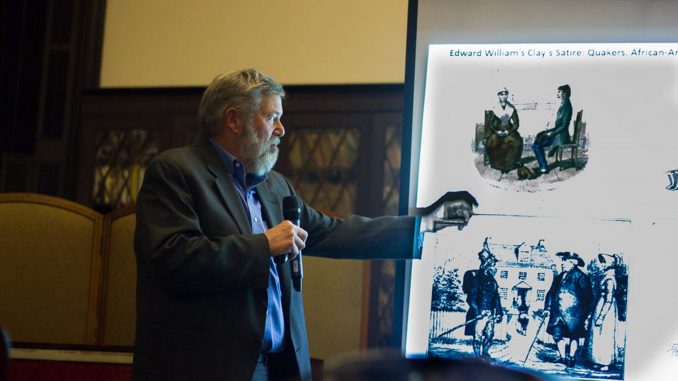
Philadelphia doesn’t own Edgar Allan Poe entirely, Ken Finkel said, but in the “age of anxiety” in the mid-19th century, when gangs like “The Spigots,” “The Rats” and “The Garroters” ruled the streets, Poe was the spokesman for the city.
Finkel, an American studies professor and a 1974 art history alumnus, held a discussion titled “Poe’s Philadelphia: Exploring Urban Anxiety,” at the first Poe Arts Festival on Oct. 28.
Finkel’s lecture contextualized Poe’s six-year stay in Philadelphia, often regarded as his most prolific time period. Poe invented the modern detective story, started a lecture series based out of his home and wrote stories like “The Fall of the House of Usher,” “The Tell-Tale Heart” and “The Black Cat” while he lived in the City of Brotherly Love.
“On one hand, Philadelphia was referred to as ‘Athens of America,’ but on the other hand it’s this incredible, disastrous urban place [full of] fear and anxiety and riots and poverty and abuse,” Finkel said. “And Halloween is a great time to bring that and Poe is a great way to bring that.”
The Edgar Allan Poe National Historic Site and the German Society of Pennsylvania hosted the event to celebrate the writer and his influence on multiple genres of art. The festival included after-hours tours and readings of Poe’s stories in the Poe House at 7th Street near Spring Garden, and performances, art exhibits, poetry readings, music and food at the German Society building across the street.
Bill Bolger, a 1975 art and architectural history alumnus, historian for the National Park Service and organizer of the Poe Arts Festival, said the event was meant to increase awareness and interest in the Poe House through art and culture.
Alaina McNaughton, a 2015 history and American studies alumna and a communications intern for the National Park Service, helped run the event. She said the art exhibits and film showings were her favorite parts of the festival.
She started volunteering at the Poe House during her senior year of college and is now writing her thesis about how the National Park Service can improve youth engagement as she pursues her master’s of public history at Temple.
“I like [Poe] and I like Philadelphia and I like that he was here,” she said. “I’m interested in that time in history so that’s why I started volunteering.”
Bolger met Finkel in 1974 in an American studies summer course at Temple. Finkel said the pair had “interesting parallel thinking about the oddity of the city, the strangeness of Philadelphia.” He invited Finkel to speak at the festival.
Bolger said in addition to the fear and anxiety in Philadelphia in the mid-1800s, Poe was inspired by locations like new cemeteries and Eastern State Penitentiary.
In the late 1980s, Bolger and Finkel advocated to preserve Eastern State Penitentiary. They helped convince former mayor Wilson Goode to preserve the prison because they thought it — and the city that inspired Poe — had as much value and power as the writer himself.
“I can’t claim I have a connection to Poe, what I do have is a connection to Philadelphia in that period,” Finkel said. “And that’s like right smack in [Poe’s] period. … We knew there was a value in preserving and interpreting the complex and conflicted city of that era. And look at Eastern State’s big success, people respond to that.”
Two cemeteries in particular inspired Poe: Monument Cemetery, formerly located at 15th Street and Montgomery Avenue until Temple purchased the land, and Laurel Hill Cemetery in North Philadelphia.
“That’s the city of Poe,” he added. “But it’s also the city that Philadelphia was. Poe gets to be the point person.”
Since Poe’s death, other writers, musicians and artists have been inspired by his work. Among them are David Plunkert, a Baltimore-based illustrator whose Poe-inspired drawings were on display at the event, and Helen McKenna-Uff, a park ranger and actress who has been portraying Poe for 17 years.
Bolger said the festival was meant to celebrate his influence and bring more people out to the Poe House.
“When you have Poe representing [Philadelphia] for us it’s like, you can’t ask for a better spokesperson,” Finkel said. “Poe immediately gets a reaction. Even if they haven’t read Poe, they know this is a guy who understood terror and fear and was not shy about sharing it.”
Erin Moran can be reached at erin.moran@temple.edu or on Twitter @ernmrntweets.







Be the first to comment